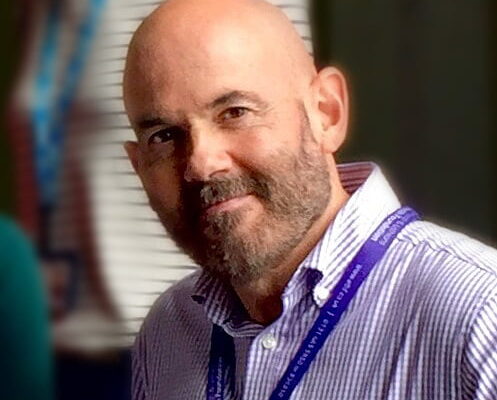Who are you?

My name is David McCartney and I am a Scot. I live in the southern uplands of Scotland, but I work in the Central Lowlands, which is the middle part of the country.
What do you do professionally?
I’m a doctor who specializes in addictions, and I work for the National Health Service, and part of the Health Service which is focused on mental health, so addictions come under that. I am the clinical lead in the service called LEAP, which stands for Lothians and Edinburgh Abstinence Program, and that is a quasi residential rehab. Normally, when it’s not COVID times, we take around 20 patients at a time. We treat about 100 people a year in a three-month quasi residential treatment program, which is based on the therapeutic community model of treatment.
Why do you call it quasi residential?
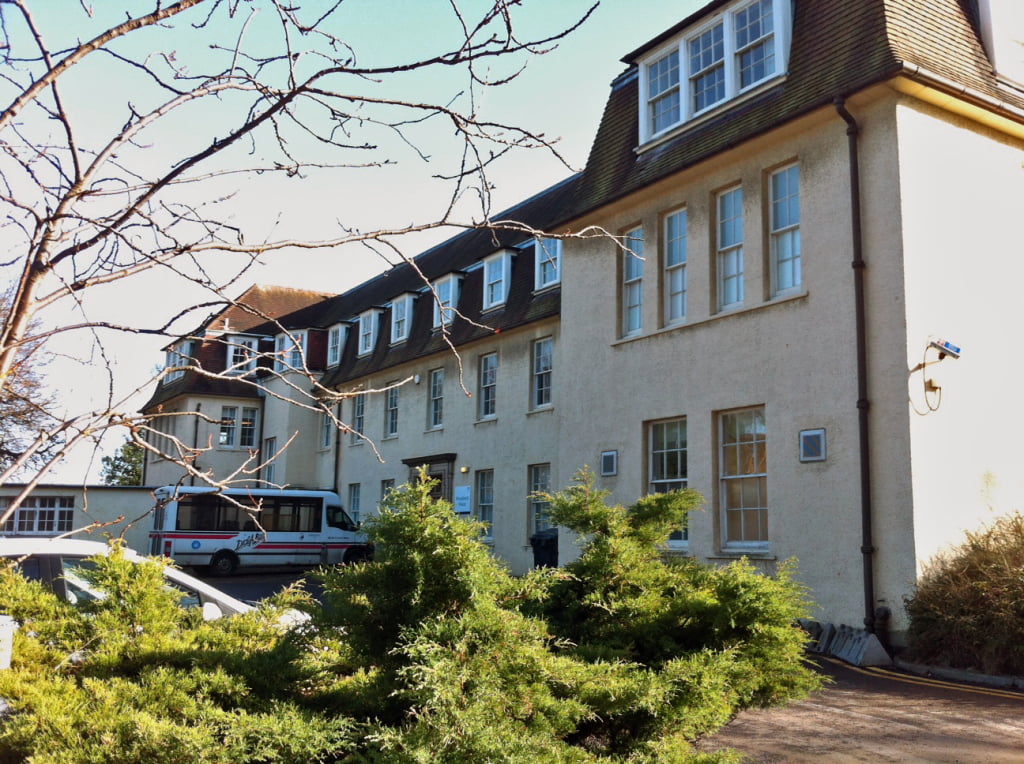
Well, the patients that we treat don’t live on the premises where the treatment is delivered so the living accommodation is separate from the treatment accommodation. And it’s a partnership approach, so the city of Edinburgh council provide the staff team which looks after the patients in the evenings, and at the weekends, and overnight, and the NHS, National Health Service team, look after the patients during the day and Saturday morning.
Do you have any personal interest in addiction recovery that you like to share?
Yeah. I’m in recovery myself, have been in recovery for many years now. I guess that’s probably the main reason that I’m working in addiction treatment because of that experience. When I was in my early 40s addiction had brought me to my knees, I was in inner-city GP, in Glasgow, in the west of Scotland, and couldn’t really get my head around why somebody from my background, with my training, and resources couldn’t stop drinking. I had two episodes of treatment, the first was very focused on medication, on getting off the alcohol, so it felt quite a medical approach. All that really happened was that alcohol was taken away, but life didn’t seem to get an awful lot better. It was a lonely kind of recovery, looking back. The second time around, I got introduced to other people who are in recovery, which was a revelation, especially other doctors, ’cause I was carrying a huge amount of professional shame associated with my drinking and not being able to stop.
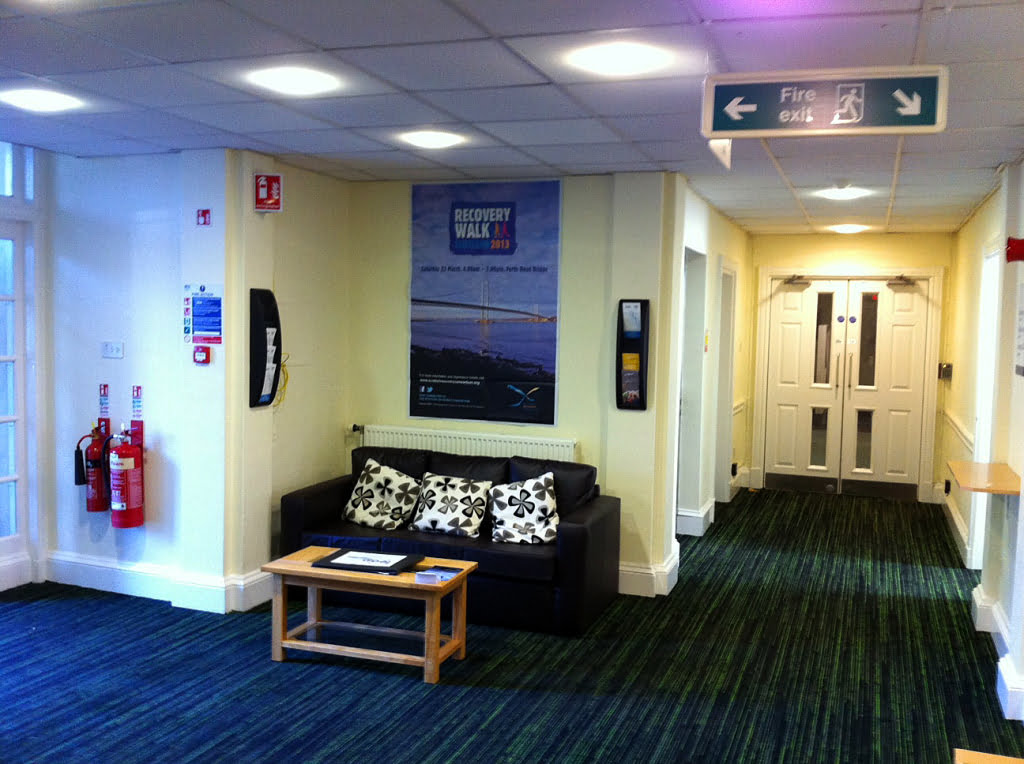
I went to a residential treatment and I didn’t really know what residential treatment was, despite having looked after people with alcohol and drug problems, some of whom had gone to residential treatment, but I had no idea what they were going to. In a sense, I had no idea where I was going to either. I might have thought twice about it had I known, but it was a transformative experience. It really turned my life around. It’s such a big impact. That’s where the seeds were sewn to change career direction and to do something with the vulnerable population in Scotland, people with alcohol and drug problems, who maybe didn’t get the same privileges as me, as a middle-class doctor who got to go to a fancy residential treatment center. Most people in Scotland don’t get that opportunity, so I wanted to try and make that different. That’s the background to my personal experience and a bit about how it intertwines with my career, and my career choices.
Tell us a little bit more about your professional experience in the area of addiction and recovery.
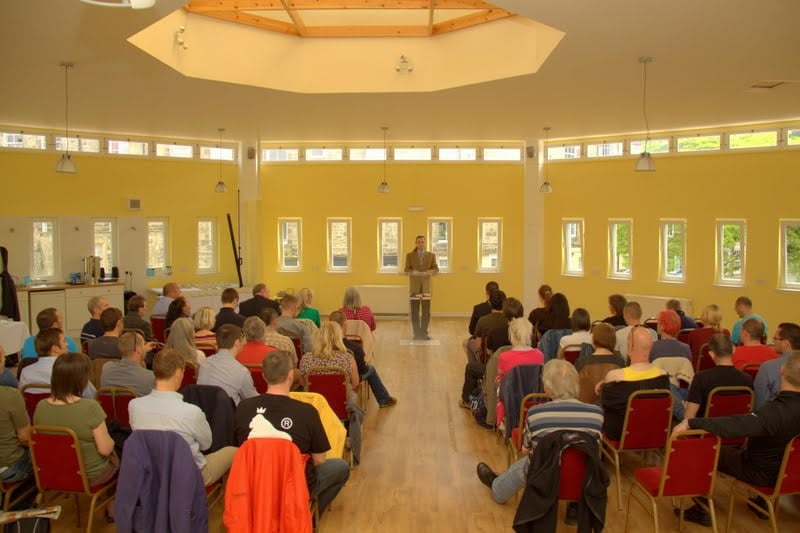
When I got better from my own addiction, I retrained and went back to university and did a Master’s degree in alcohol and drug studies. I wanted to work in the field. So, first of all, I got a little bit of experience working in a residential treatment setting. In Scotland, most of these are either in the third sector, charitable, or non-government organization sector, or private, so I have to go outside of the NHS to get that experience. I did that for a while, and then I came back to work for NHS in addiction treatment. But the addiction treatment clinics I was working in were very focused on harm reduction, which is really important, I am a harm reductionist at heart, but there was precious little time to do any kind of meaningful work. Time with patients tended to be focused on the prescription, and on the medication, and on testing, and all of that kind of stuff, and I wanted to do something different from that in the longer term.
I had an idea… first of all, I had to look to see what the literature said about residential treatment and there wasn’t an awful lot of stuff published in the United Kingdom so I had look elsewhere, to the United States, of course, a little bit from Australia. Then I went to visit some treatment centers and that was really helpful because the people who were running these places were really good and generous at sharing what was working for them and they had done the legwork, if you like, in setting treatment systems up. I then started to write down some of these ideas based on the evidence that I could find, and I started to pitch it to people that were commissioning services. One person picked up the idea and pitched it to the Scottish government who funded a two-year pilot to set LEAP up, and I knew from my visits and talking to people that run other treatment centers that there was precious little around on outcomes. I couldn’t get my head around this to start with it, so much money was going into addiction treatment, but people were not measuring what was happening to their clients. From the offset I decided whether it was going to be a success or not, we would measure what we were doing, and we’d measure what was happening to the people who we’re trying to help. That evaluation turned into a study, which is still ongoing, we’ve still got data for about up to five years after treatment now.
Long story short, the service got funded. We only had two years of funding, so we really had to prove that we were worth the investment in that time, and we were able to demonstrate to government that we were worth continuing funding being given to us, and that’s what’s happened. Ever since we’ve done the same sort of thing with evidence of what we’re doing, and that evidence has helped with funding. So, unlike elsewhere, patients don’t have to seek funding. As you’ll be aware that the two systems of health in the United States and United Kingdom are very, very different, so patients don’t have to seek funding, there are no insurance companies paying for patients to come to LEAP. If you fulfill the criteria for treatment, you’re given a place, you don’t have to worry about the funding for it.
I’ve also done a bit of work for the Scottish government on drugs policy off and on over a few years. More recently, we’re working on looking at the lie of the land when it comes to residential treatment across the whole Scotland. So, our feeling is it’s quite patchy. Some people have reasonably smooth access to it and other people, unfortunately, don’t seem to have access at all. So the Scottish government have set up a working group, which I’m chairing at the moment, which is looking to see really the scope of what’s actually happening, and then to make some recommendations to government. We’re hoping those recommendations will be along the lines of trying to have equity of access across Scotland so that if it’s the right kind of treatment for someone, they’re able to get there. So I guess that’s the answer to the question.
Professionally, what are you most proud of?
Wow, that’s a good question. Professionally, our patients and their achievements. My team, and a lot of the people I work with they’re in recovery, and they bring something of that into the professional life… a passion I suppose, and the enthusiasm for recovery. And, our service… we’ve managed to achieve a lot to help our patients get where they want to go, and to help keep them there by putting aftercare in place and connecting people up to ongoing sources of support. So yeah, these things… That’s quite a lot of things to be proud of, but professionally, my team, our patients, and the service and what we do with our patients.
In the States, addiction, recovery work is often poorly paid, funding is unstable, it’s often a difficult profession for people to stay in. What keeps you working in addiction and recovery?
I think one of the things that I get to see is people doing well because we provide aftercare for up to two years. Everyone who comes to our treatment service is from the local area, so there is Edinburgh City and then there’s three Lothian counties around Edinburgh and it’s about 800,000 in population. So, people are treated in the area that they are already living in, so when they come back for aftercare, you’re seeing them over a period of time. You’re seeing them doing well, you’re seeing their families, they are coming to the family group, and that feedback is hugely powerful. There’s an excitement to that that comes. I’ve always enjoyed my job when I was a GP in Glasgow, there was a lot of fulfillment and pleasure from that, but this is something different.
I guess you get to see the fruit of our patient’s labors over a long period of time and that’s really encouraging. I remember there was a British researcher that was looking at drug workers in a part of the United Kingdom and he was asking them, “what percentage of your clients, the people you’re working with, what percentage of them do you think will get better over time?” Their estimation was something around 7%, they reckoned only 7% of the people who we’re working with would ever recover. Of course, the actual figure is much, much higher than that. So they had low expectations, not because they were poor practitioners, but because they never saw people getting better. All they saw was people who recycled back in, who relapsed and came back. The people who did well moved out of the treatment service and didn’t need to come back. They would be successes… but they didn’t get to see that. There was no reinforcement. So for me, the reinforcement of seeing the people achieving their goals and maintaining those goals is hugely satisfying–not just satisfying, it’s exciting. I suppose that’s what keeps driving me.
How has the pandemic affected your work?
It has affected it profoundly. When the shutdown happened here in Scotland, it was quite dramatic and sudden and there wasn’t much opportunity to plan. Our service was closed very, very quickly at the beginning. We had to wind down people who were in treatments that we had to finish the treatment much sooner than it should have finished, which was really hard because we knew that was putting them at risk. Then there was a period where we weren’t able to operate at all for a few months, and during that time we lost the accommodation (housing) part of the service because it was put aside for public health to use as a kind of isolation center. We’ve been unable to get that back. So, we’ve had to find alternative premises, and we are working with a hugely reduced capacity. Instead of treating 20 people, we’re treating 8 people, which causes its own problems in a therapeutic community environment because you need a certain threshold, a number for it work effectively.
We are trying to increase capacity, we’ve got permission to do that but we don’t have accommodation to do that. So that’s been very, very hard. In addition, just recently, the city of Edinburgh council team who look after our patients after hours, they have been pulled to work in public health as well. So my team have had to move from working 9:00 til 5:00, to going to shifts which they’ve all agreed to do, amazingly. That has meant fewer people available during the day. So it’s been really chaotic. We have adapted, we’ve done our best. Our waiting list has gone up, we’re looking at ways of trying to support people on the waiting list just now. We’ve moved our aftercare program and our family program to digital platforms… amazingly, that’s actually been a success story. We’ve managed to retain most of people through Zoom and other platforms.
We’re now in a situation where we’re trying to prevent harms coming to people on the waiting list. Almost by definition, people who referred to residential treatment from our wider service – most of our referrals come from fellow treatment professionals who are working in the community with people. So doctors and community psychiatric nurses and voluntary sector agencies refer into us and they are referring the people that are probably trickiest and have the greatest burden of problems, and the least recovery capital. Maybe they’ve got co-morbid mental health and physical health issues. They’re sitting on a waiting list, and they are coming to harm. We’ve been monitoring a lot of them that had to be admitted to a hospital for emergency care, some of them been seen in accident and emergency departments, and emergency rooms for emergency treatments. We know some of that’s preventable had we been able to bring them into treatment. So, that’s been really, really hard as a doctor.
We’re doing our best to try to meet these needs but it is very difficult. In addition, of course, there is the other anxiety of trying to keep the patients safe, so we’ve put into provision a lot of things to try and do that. But of course, there is always still a risk when you’re bringing people together in a group when there’s a lot of COVID around in the environment. So we’re doing our best but it has been tough and I suppose it’s been tough emotionally as well as practically. Certainly, there’s a sustained effect over a long, long period of time and there’s no end in sight yet. So… just having to keep supporting each other and look to other ways of supporting ourselves. I’ve recently been getting into mindfulness meditation just to try and get myself a bit more grounded and not so distracted when I come home about what’s going on at work and that’s really helped.
How do you see the pandemic affecting the people you serve? You just mentioned some of them coming to harm while they’re on a waitlist. What else are you seeing?
I think the biggest thing – certainly for aftercare patients has been the disconnection. Then, of course, all of the mutual aid groups in Edinburgh and Lothian we have… We have so many mutual aid groups. We have Alcoholics Anonymous. We have got Cocaine Anonymous. We’ve Narcotics Anonymous. We’ve got Smart Recovery UK. We’ve got all of these… There is so much of a resource out there and all the meetings just had to stop suddenly. So, of course, they’ve moved to digital platforms as well which has been effective but some people don’t like digital platforms.
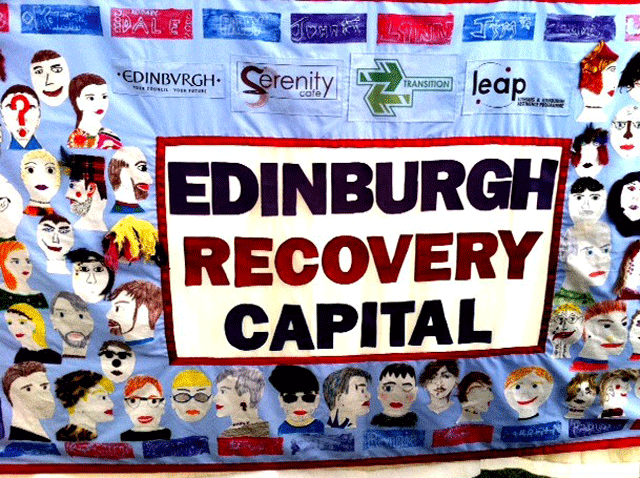
So that’s been hard. I know it’s been hard ’cause we’re hearing stories of how hard it’s been for people, sticking to the guidelines when they desperately need the contact of other people. The other thing is more societal. We have got some early… It’s mostly anecdotal, a little bit of hard evidence that people’s drinking has changed in the pandemic. If you think about people who are not yet patients, some of them have reduced their drinking, but some of the people who were probably problem drinking are now drinking in a more hazardous fashion. That, I suspect will result in more referrals coming into the system. Again, there’s a little bit of anecdotal evidence of that happening in clinics in the community. So I suspect what will happen is we’ll get an increase in referrals coming into treatment, not just to residential treatment but, across the board. And we’ll probably see increased demand on hospital emergency departments because of crisis presentations and such. It’s early days but I think it’s a case of watching the space.
What, if any, long-term effects do you anticipate on the field?
That’s an interesting question. I guess other treatment settings where funding has got to be found before the person can come into treatment… Usually in the United Kingdom that would be through either through health funds or more likely through social work funds. I suspect those services which rely on that kind of funding, some of them will fold because of restrictions and numbers that they’re having to apply at the moment. I hope one of the things that’s happened is… this kind of crisis has forced us to look at our own values of what matters. I think looking after vulnerable people with alcohol and drug problems… I hope that we have a more compassionate approach because people can see that a lot of this is coming out of hurt and isolation, and people losing their jobs, and economic crisis, and so on. So it’s a back to the old thing… You know it’s not a moral thing if you suffer from an addiction, it’s an illness. And, like every illness, it’s affected by the environment people find themselves in. This is a really difficult environment. So I hope that compassion will come out of this. But again, it’s a case of watch this space… we’re in the middle of something we’ve never been in before, so it’s unpredictable.
Has the pandemic brought any benefits or new opportunities?
I suppose it’s linked to what I’ve just said. It’s probably been one of the hardest times as a professional to try and keep that professional hat on, and not be reactive and emotional and so on. A part of me knows I’ve got to allow myself to feel, but it’s been tough. The last few months have been really tough.
I think self-care. As in the United States doctors are regulated, it’s called the Boards in the States, and we have the General Medical Council here. Part of what we have to do is have an annual appraisal, and to re-apply for our license to practice, and demonstrate that we’re able to do that. And, just recently, which I think is a really good thing, we have been advised to look to self-care and to demonstrate how we’re self-caring in our appraisal. I thought it was a really positive move, and it certainly made me sit up and take notice of how I have to care for myself. It’s like that thing when you’re on an aeroplan and you know they say that the masks will drop down, fit your own mask before you help others, you know. I need to self-care before I can really be giving my best to my patients. And, I was aware I wasn’t self-caring, I was fretting and feeling anxious, and struggling a bit, and I’m not feeling the same way now because I’m doing a bit more self-care. I mean for a lot of people who read this or listen to this, that’s probably a pretty obvious thing [chuckle] to do. But sometimes I just don’t bring myself back and think, “You need it to be caring and loving toward yourself as well as the people you’re looking after.”
If you were able to devote yourself to a fantasy project to improve treatment and recovery support, what would it be?
If I think… What would have the biggest impact across a range of different treatment services? I think this is something that is beginning to happen here in the United Kingdom, is to involve people with lived experience embedded into those systems. It has to be done carefully so that you protect the individuals and don’t abuse the privilege. But, when we first started treating patients, we heard the same thing again, and again, and again when people were coming into treatment–they didn’t know anyone else in recovery. So they’ve never met anyone else who recovered.
Back in our early days most of our patients were heroin-addicted and they’d never seen anyone get better. Then one of my colleagues, who was a Community Psychiatric nurse, told me of someone that we treated who got into recovery, and then maintained that recovery, and is still in recovery today actually many, many years later. The impact that guy had on his community… because none of his peers had ever seen anyone get better from heroin addiction. That made such a profound… All of a sudden we had all these referrals coming [chuckle] in from the same town because people wanted something like what this guy had achieved. And that stuck with me and we developed a peer support program and then we got some funding to apply to someone who’d be our peer support coordinator and look-after the peer supporters, develop a training program, and so on. And I think that if we had people with lived experience, who were trained and supported in other services… at the places where needle exchange is happening, and we’re trying to get people engaged into opioid replacement treatment, and we’re trying to save lives essentially. If you had peer supporters there, people with experience, who’ve maybe been there a few years ago, and delivering the needles, and caring for them, and sharing a little bit of the story at the same time, that would generate hope. And, as you know, as we all know who work in addiction treatment, hope is not a thing, you can’t put it in a bottle and you can’t prescribe it, but you can influence it, you can demonstrate it with hopeful people and people whose lives have been changed.
I’d like to see that… it might be my fantasy to see that role across Scottish Addiction Treatment Services where you had role modeling and enthusiastic recovery of different sorts, and not necessarily one brand, but to give hope to the people that come into our services.
